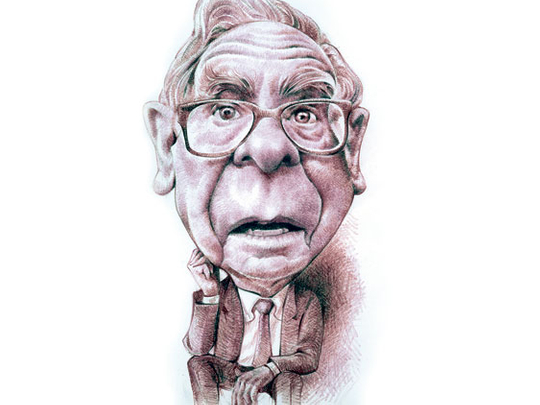
It used to be worth the cost of flying to Omaha, Nebraska, for Warren Buffett's annual lovefest, the Berkshire Hathaway annual shareholder meeting where you got information available nowhere else.
Buffett warned of the systemic risk of derivatives as long ago as the 1993 meeting. In 1996, he and sidekick Charles Munger gave a lesson on what makes a bank successful: management that highlights return on assets and efficiency above all else. Minding these lessons would have saved investors a lot of money during the financial crisis.
Today the seasoned professional investors who attend are there out of loyalty, or to piggyback on the meeting and promote their own businesses. Younger money managers come because it's a chance to see it before it's gone. Few of these people expect to glean amazing insights. The thrill is gone.
The meeting has become overvalued, like a stock gobbled up by the dumb money piling in at the late stages of a bubble. I cop to being guilty of contributing to the bubble. When people ask me whether to attend, I always say yes, because the show won't go on forever and you will want to have seen it. After 13 years of going to Omaha, I finally took a year off because of a schedule conflict, but still hope to go next year. There is always a chance you will hear something interesting.
Nonetheless, the Berkshire Hathaway shareholder meeting "has become a hospice for value managers," says Ed Studzinski, manager of Oakmark's Equity & Income Fund.
The meeting has grown into a circus populated by television commercial characters come to life, a model train set, and people dressed as giant foam bricks. It is a product, one sold mainly to people who want to experience the novelty of being in Buffett's presence. Its highlights are broadcast instantaneously on TV, so for everyone else, the point of being there is to buy discount underwear at the Fruit of the Loom booth and have your picture taken with the guys in fruit suits.
Another reason the meeting offers fewer gems is that it has grown contentious. This year, two difficult issues popped up: Berkshire's $5 billion (Dh18.3 billion) investment in Goldman Sachs Group and Buffett's lobbying in Washington for a special exemption to a bill regulating the derivative deals that Buffett struck shortly before the financial crisis.
Buffett could have used his position to offer moral leadership and influence the political debate on financial-services reform. Instead, he gave a vigorous defence of Goldman Sachs. He justified the technical legality of Goldman's actions outlined in the Securities and Exchange Commission fraud suit, and was persuasive on the sentimental reasons for why he likes the company.
Then it went downhill. If Lloyd Blankfein had a twin brother, Buffett said, he would support him as chief executive officer of Goldman. Yet he said Blankfein didn't tell him about Goldman's Wells notice, which informed the firm that it was the target of an SEC probe. Even though Berkshire discloses all its Wells notices, he said it was immaterial in Goldman's case.
Berkshire is getting 10 per cent interest on $5 billion of redeemable preferred stock and warrants that strike at $115, and Buffett seems struck blind by the money. He said Goldman's woes will abate, and they will. But he doesn't seem to understand that this episode will be a permanent mark on its — and his — record.
The comments of Munger, Berkshire's vice-chairman and a man who is incapable of being disingenuous, threw into relief the way that Buffett seemed to be clinging to legalities rather than showing sensitivity to the public's anger at Goldman's callous behaviour toward taxpayers and investors. There is a difference, Munger said, between being ethical and following the letter of the law. While he said he would have voted with the two SEC commissioners (out of five) who objected to suing Goldman, he wasn't championing the firm's behaviour either.
Corporate culpability
What I wanted Buffett to say was what he has said in similar situations about news of corporate culpability: Get it right, get it fast, get it out. March down to Washington, Lloyd, sit down with SEC Chairman Mary Shapiro and say, "Madam Chairman, what would you like us to do? Thank you, we'll get right on it, and we apologise to the taxpayers and investors." If she says, "Your successor takes over July 1 and must not be a former trader, just say, OK."
That kind of principle-based thinking was missing throughout much of the meeting. It is now necessary to parse Buffett's words like any other CEO's.
He touted one quarter's earnings of NetJets as if they were meaningful, defended Berkshire's lobbying in Washington, justified the firm's use of "financial weapons of mass destruction" (derivatives), trashed the actions of the CEO of Kraft Foods while defending those of the CEO of Goldman Sachs, and talked of a future of higher inflation rates and lingering unemployment on the heels of a year of cheerleading investors to buy US stocks at high valuations.
You can get this kind of corporate gobbledygook on company conference calls every quarter. So the main reason to go now is the circus. In an unprecedented and death-defying move, Buffett has already scheduled both the 2011 and the 2012 meetings. Assuming the pattern continues, these will be bigger than ever, but no better. And if the shareholder meeting has become a bubble, then the question is, how long before it pops?












